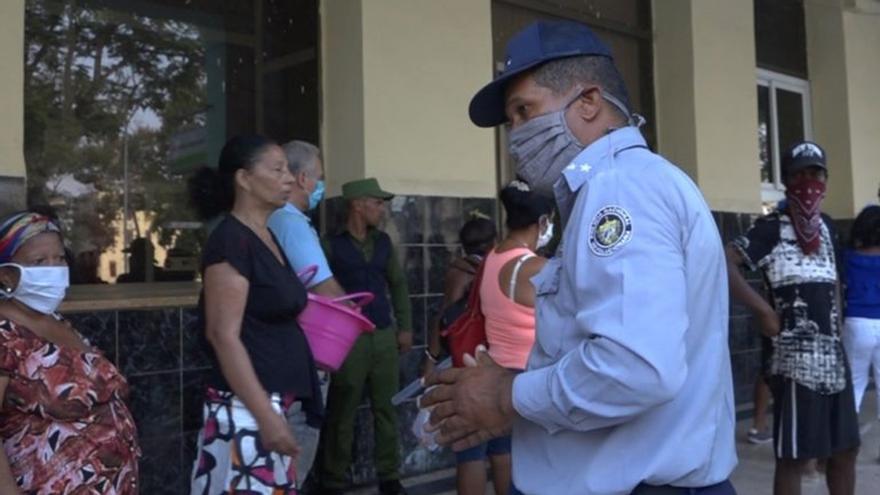
![]() 14ymedio, Havana, 18 June 2021 — It is not new that the Cuban state’s battle against resellers, acaparadores (hoarders), and and coleros (people who stand in line for others), has moved into digital territory, but it grows in the heat of the expansion of the internet and the shortage of products. In Pinar del Río, the number of police operations against sales through social networks now rises to 15 a week, the result of a hundred complaints in the same period, as announced this Thursday by Colonel Julio Díaz Rodríguez, delegate of the Ministry of Interior in the province.
14ymedio, Havana, 18 June 2021 — It is not new that the Cuban state’s battle against resellers, acaparadores (hoarders), and and coleros (people who stand in line for others), has moved into digital territory, but it grows in the heat of the expansion of the internet and the shortage of products. In Pinar del Río, the number of police operations against sales through social networks now rises to 15 a week, the result of a hundred complaints in the same period, as announced this Thursday by Colonel Julio Díaz Rodríguez, delegate of the Ministry of Interior in the province.
The officer participated in a meeting of the group in charge of supervising the ’Ordering Task’* in the province, which was attended by Vice President Salvador Valdés Mesa. Díaz revealed that more than 500,000 actions have been carried out, of which at least 1,000 were related to hoarding, and that about twenty coleros have been located, mainly linked to the resale of products that are sold in stores in freely convertible currency (MLC).
The meeting also spoke of 3,261 price and rate violations among state and private workers who fail to comply with Decree 30 published at the end of January. The authorities highlighted that in the municipality of Pinar del Río there is a trend to increase fines for this type of infraction.
Since last year, the Government has carried out a fierce persecution against the informal market as a result of the acute economic crisis that the country is experiencing due to the pandemic. The official media have echoed the police operations while the authorities do not miss the opportunity to hold the violators responsible for the worsening of the shortages and to issue warnings.
Specifically, a television report broadcast from Pinar del Río last August, detailed the offensive against an informal merchant who used Facebook to promote her merchandise, most of it imported. The seller, prosecuted for the crime of “illegal economic activity and bribery”, used sites or forums on the internet “to promote the sale of these products.”
On December 31, 2013, the sale of imported clothing, footwear and other products was prohibited in Cuba. Until that moment, a growing private business of sale of merchandise from countries such as Guyana, Mexico, Panama, Nicaragua and Haiti spread throughout the island. The activity had proliferated under the protection of the “dressmaker” or “tailor” licenses. The ban on this trade plunged thousands of sellers into the black market.
In September of last year, the police in Cabaiguán, Sancti Spíritus, exposed last year a network that sold basic necessities on digital platforms. One of the ten defendants was sentenced to ten months of deprivation of liberty for “illicit economic activity.” The authorities also identified 28 coleros, who were give official warnings.
In the same province, months before this operation, the newspaper Escambray published a report saying that the police had identified 89 coleros, who were prosecuted or warned. It also referred to the dismantling of a network of 14 hoarders, who sold personal hygiene products, food and also household electrical equipment, items that are sold in stores that only take MLC. On that occasion, three people were accused of illicit economic activity and disobedience.
In December 2020, the newspaper was able to capture on video a raid in the capital carried out against informal vendors who offered cleaning products and household supplies in the municipality of Centro Habana. They carried out the operation on the corner of Neptuno and Galiano, two of the capital’s main arteries where the black market is a very common activity.
#Cuba | En la céntrica esquina de las calles Neptuno y Galiano en La Habana las autoridades hicieron una redada policial contra vendedores informales que ofertan, especialmente, productos de aseo y útiles domésticos. Manténgase informado con nosotros. pic.twitter.com/NqpricB9DU
— 14ymedio (@14ymedio) December 1, 2020
*Translator’s note: The so-called ‘Ordering Task’ (Tarea ordenamiento) is a collection of measures that includes eliminating the Cuban Convertible Peso (CUC), leaving the Cuban peso as the only national currency, raising prices, raising salaries (but not as much as prices), opening stores that take payment only in hard currency which must be in the form of specially issued pre-paid debit cards, and others.
____________
COLLABORATE WITH OUR WORK: The 14ymedio team is committed to practicing serious journalism that reflects Cuba’s reality in all its depth. Thank you for joining us on this long journey. We invite you to continue supporting us by becoming a member of 14ymedio now. Together we can continue transforming journalism in Cuba.
